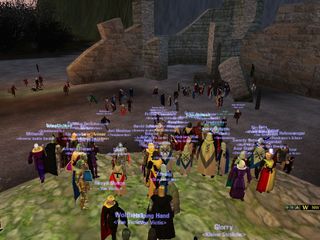What it’s like to manage a gaming community on fire
Community managers talk about the human cost of anger and death threats from impassioned fans.

Micah Whipple didn’t believe in Real ID. It was unveiled in 2010 as a new social initiative in the Blizzard forums, effectively forcing players to register their real names instead of Battle.net aliases to cut down on the witch hunts and treachery that so often define anonymous, online public spaces. Whipple thought the policy would be unsustainable and unenforceable, but as a World of Warcraft community manager it was his job to go to bat for it. The CM role is simple: be a plebeian, embed yourself in the community, serve as liaison between publisher and community, and most importantly, stay optimistic.
What that really means: when the players got angry, Whipple was paid to run into burning buildings. Sometimes he was a firefighter, and sometimes he was a meatshield.
“As a Blizzard fan, but also a staunch defender of a company I loved working for, I defended the proposal by giving people my real name as proof it wasn’t going to be a big deal. My name was information that was freely available, so it seemed like a non-issue,” says Whipple. “But as one could expect I became a target for the whole thing and received a lot of death threats, threats of sending stuff to my house, releasing whatever info they could find. All the kind of stuff we’re all pretty used to happening these days, but back then was not really something we were readily exposed to.”
Whipple was doing his best to be a good employee and taking one for the team over an idea he didn’t necessarily believe in. It’s part of the job description. Developers behind the scenes cook up controversial mechanics or balance changes, and the community managers field the fallout. Most of the time he was able to find relief taking smoke breaks with his co-workers to scoff at the eternal scorn (generally the people in the department averaged a half-pack a day). All it takes is one patch, or dubious nerf, or broken mechanic for a passionate player base to turn the forums into a rebel state.
Sometimes community managers are firefighters, and sometimes they're meatshields.
“Most bombshells that drop are known beforehand since they tend to come from outward announcements, but things like bad launches or service issues are sometimes harder to predict and will result in late nights and weekend coverage,” says Whipple. “If you’ve done what you can do, and the only thing left is to ensure the feedback keeps making its way to the developers, it’s usually not going to add a lot of value to continue to agonize over people’s anger or continue engaging and repeating yourself. The trap you have to work hard to avoid is considering it solved, and disengaging from it entirely. Those things can smolder and burn for a long time if they’re not put out decisively enough.”
As violent as it was, the Real ID pushback was managed. But at a price. Real ID was one of the more painful experiences in his life. “I think [Real ID] actually woke me up a bit, and made me realize my employment with any company is a partnership, and not any kind of debt or life-oath that I need to repay,” he says.
“[Being a community manager] requires a huge amount of empathy, so of course if you’re reading negativity day in and day out it’s difficult not to take at least some of that with you,” continues Whipple. “With enough experience you can kind of catch it before it gets bad and take a step back, but more than a couple times I found myself in really dark depressive states for quite a while just due to, essentially, surrounding myself for eight hours a day with people’s hate. Pile on top of that just all the standard stuff that’s going on in life, and it can get very real very quickly. Looking back, and having a better understanding of what depression actually looks and feels like, it’s probably something I should’ve sought professional help for.”
The biggest gaming news, reviews and hardware deals
Keep up to date with the most important stories and the best deals, as picked by the PC Gamer team.

Those controversies seldom deserve the antipathy they inspire. When Blizzard introduced a subpar card for the Priest class in Hearthstone, lead designer (and public face of the game) Ben Brode was forced to take to YouTube for an apology tour. There was a months-long political panic centered on a Tracer victory pose. There are legitimate reasons to be angry about videogames, but the righteous fury we’re used to usually looks extreme after a controversy blows over. In the moment, when a community is on fire, part of the citizenship is going to pour on gasoline, and it’s the community managers who get burned.
“Fundamentally I can at least understand what might lead to someone to be pissed off at a six percent changed to a five percent, [but] I found myself resenting and dismissing people more and more that just didn’t seem to have anything of constructive value to say,” Whipple says.
Maintaining optimism seems like a nearly impossible part of the job, but great community managers always find a way to care, no matter how bad it gets.
Staying invested
Alex Leary has worked as a community manager for over a decade. He says one of the biggest issues he faced professionally was during his stint on Everquest after the Shadows of Luclin expansion. Essentially every 12 to 24 hours servers would shut down randomly, immediately smiting anyone who happened to be online.
“Everquest was a hardcore game. If the server crashes while you’re fighting monsters you’re gonna come back dead, and you’re going to lose experience by dying. It was like someone reaching through the screen and poking every player in the eye,” says Leary.
Bad server code isn’t really a storm you can prepare for. The average community manager doesn’t have the correct skillset to decipher a faulty network—much less explain it to the masses—but that’s the deal. Nobody else is going under the bus. It's you, every time. After years of being held personally accountable for every mistake, you think it’d be easy to grow numb. According to Leary, that’s one of the biggest mistakes you can make.
“You have to stay tapped-in,” he says. “If you can’t keep that in balance and you start tuning out and ignoring customers… you want to make people feel listened to. You want to empower those advocates, those hardcore players who will then turn around at 3am when you’re not on the forums and have your back. That’s how you keep the pitchforks away.”

Still, Leary is probably painting a more idyllic picture of what goes on in your average video game forum. Anger incited by server crashes is understandable, but a lot of dust-ups center on far more subjective things—like the AWP’s damage output (one shot to the body to kill? Really? How am I supposed to counter that?,) or Hanzo’s dodgy hitbox (fix your game Blizzard!). Most of the time the community doesn’t have access to the hard data, and naturally, a lot of them don’t know what they’re talking about.
“From a very high customer service level I believe everyone’s complaint is legitimate, because it’s legitimate to them. That said, most people are wrong most of the time about most things,” says Whipple. “There are a lot of cognitive biases that lead to the different types of online community interactions and herd behaviors, and one of the greatest challenges—and greatest powers—is learning how to counter them. The biggest challenge, and one that I think mostly goes without a good solution, is that a fairly large contingency of any large community believes they’re smart and right most or all of the time. And the infuriating thing (to me) is that a lot of times people believe they’re right because someone else said it, and they read it or heard it somewhere.”
That’s the core paradox of being a community manager. You’re locked in a permanent debate. You might enlighten a few, but there’s an endless stream of righteous complaints waiting in the wings.
“Online discussions are some of the biggest victims of a lack of curiosity, of creativity, and of an overwhelming belief in personal superiority over others. And it’s not just a couple people being pigheaded. Negativity is an increasingly popular way to perceive and communicate with the outside world,” says Whipple.
But maybe that’s why community management is so vital. The job is to resist cynicism and remind the commonwealth why they fell in love with the game in the first place. They may never stem the tide, but the community managers who can weather the storm sometimes build lifelong connections.

When it's worth it
Sanya Weathers was hired off an EverQuest rant site to serve as the CM for an upstart MMO called Dark Age of Camelot. She was paid very, very little money, but dived into the gig headfirst. “I am not sure if I’m the first in the games industry to treat this job like relationship building, but I was at least in the first wave,” she says.
“I learned very quickly that my biggest weakness and my biggest strength was missing the forest for the trees. That is the main thing that causes anger and frustration for players,” continues Weathers. “What sounds like constant moaning is actually a hundred different complaints when you zoom in closer, and almost all of the issues can be handled by giving more information, by including people in the bigger picture. So I don't get numb to it, because I'm right there in the trees with my players. I can then take that feeling and use my privileged access to get the whole story and share it.”
Weathers calls herself incredibly lucky. She’s never had to deal with a truly destabilizing controversy. Small ones, though? Sure. There was the time a typo in a class ability spreadsheet turned a 0.05 percent boost into a 50 percent boost, or how, after months of conspiracy theories from players, it was finally discovered that a mechanical error was causing “charisma” to have a measurable weight on all combat rolls. She’s also dealt with some sizable customer service issues, in her words “a corrupt developer or a grossly-biased [corporate social responsibility], which had to be removed.” It was in those moments where Weathers thrived.
“It's funny, things like that—which actually are big and I've lived through too many for my taste—don't register as ‘big’ with a community that has had proper communication,” she says. “No, what registers as ‘big’ is when a player is caught cheating, and insists he wasn't cheating, and suddenly a routine CS matter is now this psychotic Rorschach test, this net-wide referendum on whether or not the company has earned the trust of the customer. But that's where I earn my paycheck. Not by how I react in the moment, but whether or not I was able to communicate my company's integrity before the trouble hits.”
I earn my paycheck not by how I react in the moment, but whether I was able to communicate my company's integrity before the trouble hits.
Sanya Weathers
Weathers treats community management like a batting cage in the park. The balls keep coming, she keeps swinging until the machine runs out. “Then you have the shakes and pee yourself, whatever, while it’s going, you keep going.”
Years later, long after that game closed and its developer Mythic Entertainment was absorbed into the greater EA hierarchy, her prodigal return is beseeched in a post on the subreddit for the Kickstarter-funded revival Camelot Unchained.
“I know it's way off and I know she is already employed but I will be damned if I don't say anything. That woman was amazing at connecting with the community and keeping everyone posted,” it reads. “If one of your stretch goals is to hire her you would get a lot more money... just saying.”
None of these people have left the business. Whipple works as a content manager at NCSoft now, but he stayed on Blizzard's community team till 2015—five long years after the community's worst uncovered his home address during the Real ID fiasco. Leary started his career as an EverQuest game master, and has since CM’d in City of Heroes, Pocket Legends, and currently The Pokemon Trading Card Game. Putting out those fires is exhausting, but it must also be a little bit rewarding for them to stick with it.

“All of my jobs come from people who have seen community management in action and realize how tremendously it amplifies their work and how it builds momentum and goodwill and word of mouth,” says Weathers. “Good community, one that is based on human exchanges and not on collecting ‘likes’ like a squirrel hoarding acorns, is magical. Likes are nice, but all they represent is potential—potential for action. Not a goal in and of itself. A good CM knows the player has already bought the game and doesn't need to be sold anything. A good CM genuinely cares if the players are having a good experience. A good CM builds real relationships, based on give and take, with players, the press, and the people who are both.”
Community management can often feel static. The outrage is cyclical. No matter how many minds you change or egos you soften, there’s always another flare-up around the corner. But if you do the job right, those bonds can last forever. Weathers listened, and sympathized, and returned the next day. The bellyaching is in the past, and what's left is a lot of appreciation for someone who was always there.
Community managers wear a lot of hats. They’re social media arbiters, PR reps, and occasionally meat shields. But more than anything else, they’re paid to believe the angry mob is an illusion, and that civility is only a good conversation away.

Luke Winkie is a freelance journalist and contributor to many publications, including PC Gamer, The New York Times, Gawker, Slate, and Mel Magazine. In between bouts of writing about Hearthstone, World of Warcraft and Twitch culture here on PC Gamer, Luke also publishes the newsletter On Posting. As a self-described "chronic poster," Luke has "spent hours deep-scrolling through surreptitious Likes tabs to uncover the root of intra-publication beef and broken down quote-tweet animosity like it’s Super Bowl tape." When he graduated from journalism school, he had no idea how bad it was going to get.
Most Popular

